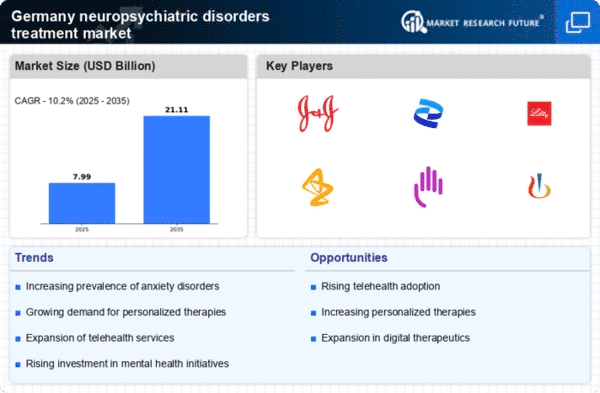Advancements in Treatment Modalities
Innovations in treatment modalities are reshaping the neuropsychiatric disorders-treatment market in Germany. The emergence of novel pharmacological agents, including atypical antipsychotics and rapid-acting antidepressants, has broadened the therapeutic landscape. Additionally, non-pharmacological interventions, such as cognitive behavioral therapy and mindfulness-based approaches, are gaining traction. The integration of technology, such as telemedicine and mobile health applications, enhances accessibility to treatment, particularly in rural areas. According to recent data, the market for digital therapeutics is projected to grow at a CAGR of 20% over the next five years. This evolution in treatment options not only improves patient outcomes but also encourages healthcare providers to adopt a more holistic approach to mental health care, thereby driving the neuropsychiatric disorders-treatment market.
Increased Awareness and Stigma Reduction
The growing awareness of mental health issues and efforts to reduce stigma surrounding neuropsychiatric disorders are pivotal in shaping the neuropsychiatric disorders-treatment market. Public campaigns and educational initiatives have significantly improved understanding and acceptance of mental health conditions in Germany. As a result, more individuals are seeking help and treatment, which is likely to increase market demand. Recent surveys indicate that 60% of the population now recognizes the importance of mental health, compared to only 40% a decade ago. This shift in perception encourages individuals to pursue treatment options, thereby expanding the patient base for healthcare providers. Consequently, the neuropsychiatric disorders-treatment market is expected to benefit from this cultural transformation, leading to increased investment in mental health services and resources.
Rising Demand for Integrated Care Models
The shift towards integrated care models is emerging as a significant driver for the neuropsychiatric disorders-treatment market. In Germany, healthcare systems are increasingly recognizing the need for a multidisciplinary approach to mental health treatment. This model combines medical, psychological, and social support services, ensuring comprehensive care for patients. Recent data suggests that integrated care can improve treatment outcomes by up to 30%, making it an attractive option for healthcare providers. As more institutions adopt this model, the demand for collaborative treatment solutions is expected to rise. This trend not only enhances patient satisfaction but also optimizes resource utilization within the healthcare system, thereby positively impacting the neuropsychiatric disorders-treatment market.
Regulatory Support and Policy Initiatives
Regulatory support and favorable policy initiatives are crucial drivers for the neuropsychiatric disorders-treatment market in Germany. The government has implemented various policies aimed at improving mental health care access and quality. For instance, the Mental Health Act emphasizes the importance of integrating mental health services into primary care. Additionally, funding for mental health research and treatment programs has seen a notable increase, with the government allocating approximately €1 billion annually for mental health initiatives. These supportive measures not only enhance the treatment landscape but also encourage private sector investment in the neuropsychiatric disorders-treatment market. As regulations evolve to support innovative treatment approaches, the market is likely to experience sustained growth and development.
Growing Prevalence of Neuropsychiatric Disorders
The increasing prevalence of neuropsychiatric disorders in Germany is a significant driver for the neuropsychiatric disorders-treatment market. Recent studies indicate that approximately 27% of the German population experiences some form of mental health issue, including anxiety disorders, depression, and schizophrenia. This rising incidence necessitates enhanced treatment options and healthcare services, thereby propelling market growth. Furthermore, the aging population, which is more susceptible to neuropsychiatric conditions, contributes to this trend. As the demand for effective treatment solutions escalates, pharmaceutical companies and healthcare providers are likely to invest more in developing innovative therapies, thus expanding the neuropsychiatric disorders-treatment market. The focus on early diagnosis and intervention strategies also plays a crucial role in addressing these disorders, further stimulating market dynamics.






















Leave a Comment